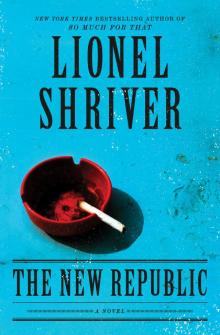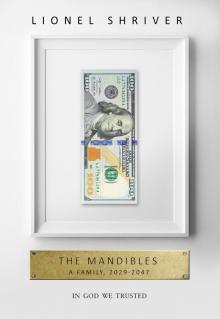- Home
- Lionel Shriver
So Much for That: A Novel Page 8
So Much for That: A Novel Read online
Page 8
Finally, he settled before his computer and went to the Web page whose address the search engine brought up after three keystrokes. When he reached “Survival Rates,” he refused to pause even briefly; taking the plunge without hesitation had always been the best approach to diving into the icy White Mountains swimming hole of his boyhood. He scrolled down. He read carefully to the end of the section, and then read it a second time. Once he shut down the computer, he tried to cry softly, that he not wake his wife.
Chapter Four
At Randy Handy—a salacious staff sobriquet so obvious that you’d think Pogatchnik would have headed it off with a company name less vulnerable to perversion—Jackson had adopted a new perspective. He’d let his coworkers make all the sarcastic remarks about Shep and his pathetic “escape fantasy” they liked. Eventually they were bound to find out why the former owner was still yes-massahing Pogatchnik, and then they’d feel bad. Really fucking bad. Jackson was looking forward to it.
He’d concede that in the friendship he’d long played something of a sidekick, but starting with the god-awfully stupid sale of Knack, which demoted Shep from boss to fellow schmo, and now with the plain god-awful business of Glynis and the Fall of Pemba, that dynamic had subtly flipped. These days he was Shep’s protector. The role came at a price. He couldn’t ask for anything. When Shep had been the stoic stalwart, he could lean on the guy. No, he hadn’t ever put his hand out (like everybody else in the schmuck’s life). Still, what with Flicka, an on-again-off-again predilection for gambling, and a not-unrelated little difficulty with credit card debt, he’d always been the one with the problems who needed advice. Now he had to keep his mouth shut, and for Jackson keeping his mouth shut, ever, about anything, was unnatural.
That said, there was one subject he’d been tempted to raise for some time, and at least on this point he was relieved to have a better reason to put it off than the usual cowardice. It wasn’t the sort of thing you talked about with other men, even if it should have been, since you sure weren’t going to talk about it with women. Besides, there was something to be said for the restoration of the concept of privacy in a country where at the average bus stop you were as likely to be regaled with the story of some stranger’s abortion as asked for a light. He’d set the date anyway, so there was nothing, really, to discuss.
When they left at 1:00 p.m. for their stingy forty-minute lunch break, Shep asked if maybe they could walk instead of eat; intent on getting straight home to Glynis after work, he could no longer make time for their tri-weekly weight-lifting sessions at the Fifth Avenue Gym. (Jackson was a little relieved to get out of the team workouts; Shep always showed him up.) Though forgoing his sandwich made him petulant, Jackson had to say no problem. Basically in the face of cancer, even of cancer once removed, you had no rights.
“You know, Glynis would never have been able to keep her secret much longer even if she’d tried,” said Shep as they hustled down Seventh Avenue; it was too damned cold for a casual stroll. “The bills have started to arrive.”
“Yeah, tell me about it,” said Jackson. “Let me guess: it’s not one bill, it’s dozens, right? Going on for fifteen pages, from every little radiologist and every little lab. And that ‘EOB’ thing!”
“Explanation of Benefits—or lack of benefits, more like it. It’s byzantine.”
“Carol does the paperwork for Flicka, and I’m so grateful I could cry.”
“What kills me is how near-impossible it is to figure out what you owe. Before I brought in an accountant, I used to do the books at Knack myself, and I’m no slouch in that department. But it took me hours to sort out what to send in and where.”
“Fucking hell, you’d think they’d make it easy to give them money,” said Jackson. “Still, I think it’s deliberate. The blizzard of paper, all the numbers and codes. It’s a smoke screen. Behind which you get charged three hundred dollars for a Band-Aid and you don’t notice.”
Jackson shot a ritually despairing glance down the avenue. He missed the old Park Slope—a few failing pizza joints, coffee shops that didn’t charge four bucks a pop, hardware stores with barrels of screws instead of little packets of four all wrapped in plastic. “Gentrified”—though he was hard pressed to see how an army of whiny Barnard grads plowing them into the gutter with strollers the size of troop transporters qualified as “gentry”—it was all yoga parlors, organic smoothie bars, and pet therapists.
“And, you know, what Carol mentioned?” said Shep. “But I didn’t understand at the time. This World Wellness Group. They cover procedures according to prices that are ‘reasonable and customary’ in your area. In other words, what the fee should be, and not what it actually is.”
“This stuff is news to you, pal?” Jackson felt a surge of pitying condescension.
“I did some digging online. The outfit that generates this ‘reasonable and customary’ figure? It’s another unit of the same company. They’re under no legal obligation to tell you how they arrived at it. And it’s in both outfits’ interests for that figure to be as low as possible. As far as I can tell, they could be making it up.”
“Here’s how it works,” Jackson explained benevolently. “We’re going on a trip, and it’s your car, so I’ve agreed to pay for gas. We stop at a station, you fill up the tank, tell me the gas was fifty bucks, hold out your hand. With an expression on my face like I’m doing you a big favor, I hand you a twenty. You say, what’s this? I say, but that’s what a tank of gas should cost—since that’s what it cost when I was twelve. Basically, the insurers live in a fantasy world, and we Mugs are stuck in the real one.”
Shep shook his head. “Glynis and I have always kept to a tight budget. Trying to build that nest egg for The Afterlife. We’ve waited for the two-for-one offer on shampoo. Bought toilet paper in the economy size of twelve rolls, single ply. Got the special on turkey burgers even if we were more in the mood for steak. Now it’s five hundred for this, five thousand for that … And they never tell you in advance what it costs. It’s like going on a spree, piling all this shit on the counter, and none of it has any price tags. We only pick up twenty percent in co-insurance, but that’s after the five-K deductible. One single lab bill—that’s a hell of a lot of toilet paper.”
“Double-ply,” said Jackson.
“I’m thinking, why did we ever eat turkey burgers? And then I remember that I’m not supposed to care. Ultimately, I don’t care. All that matters is Glynis.”
“That’s what they’re counting on, bud. That’s the whole scam in a nutshell. Same with Flicka. It’s your kid, right? So what are you gonna say, no we’re not going to treat her pneumonia—again—cause we want the kind of DVD that records? And, friend … I hate to say it, but for you this is just the beginning.”
“I know,” said Shep quietly, as they hung a left on Ninth Street and headed for Prospect Park. “Even to cover the last stack of bills … Well, you know I’ve kept this other account, where I put the proceeds of the sale of Knack once I paid off the feds. It’s earmarked for The Afterlife, and I’ve never touched it. But there wasn’t enough in our joint checking, so I had to tap the Merrill Lynch. I’d never written a single check on it. Number 101 went for the CAT scan.”
“My guess is you’re already on 115. Take my advice, and order another checkbook pronto.”
“Signing that first one was strangely emotional. Even if it’s ‘only’ money, as my father would say.”
“Yeah, ‘only’ the proceeds from over twenty years building your own business. ‘Only’ eight years of humiliation with Randy Pogatchnik.”
“It doesn’t matter. I just didn’t realize at the time what I was really saving for.”
“You ever think about it? Pemba?”
“No,” said Shep, and changed the subject. “I guess we’re lucky, though. We live in the States. Hey, we get the best medical care in the world.”
“Think again, pal. In comparison to all the other rich countries like England, Australia … Canada … I
don’t remember the rest. Look at all the statistics that matter—infant mortality, cancer survival, you name it? We come in last. And we pay twice as much.”
“Yeah, well. At least we don’t have socialized medicine.”
Jackson guffawed. Shep wasn’t stupid, but he could be painfully cooperative. That “socialized medicine” bogyman went all the way back to the 1940s, when Harry Truman had wanted to bring in a national health service, just like the Brits. Nervous that doctors wouldn’t keep raking it in, the American Medical Association concocted this inspired cold war buzz phrase, which had struck terror in the hearts of their countrymen ever since. A genius stroke of labeling. Like when supermarkets came out with that “no frills” line, packaging a perfectly standard, decent product in stark, ugly-ass black-and-white, thus ensuring that no one with any class would buy it, at half the brand-name price. It worked. Even Jackson’s cash-strapped mother hadn’t wanted to be caught dead with no-frills tissues in her cart.
“You realize fortysomething percent of this country is either on Medicaid or Medicare?” said Jackson; history lessons always put Shep to sleep. “All this ooh-ooh about how we don’t want ‘socialized medicine.’ Well, we got socialized medicine, for nearly half the population. So the other half is paying twice. Your Mugs are paying for your Mooches’ CAT scans with confiscatory taxes”—confiscatory was a wonderful word Jackson had learned only about a year ago, and he used it at every opportunity—”and a second time for their own damn scans.”
“You sound so down on Medicare and Medicaid. But you’re not saying that you wish old and poor people didn’t have access to health care.”
Jackson sighed. That line was so predictable. Shep was a class-A Mug. For the ranks of complacent dupes to which, alas, Jackson also belonged, Shep Knacker could be the mascot. “No, I’m not saying that. My point is, guys with health benefits don’t think they’re paying their own medical bills. They cling to their precious employee health insurance as if it’s this great freebie. It’s not free! They don’t understand they’d be getting, like, fifteen grand more in salary if it weren’t for the damned health benefit! It’s fucking sad, man.”
“Money’s gotta come from somewhere, Jacks. Some big national thing would send taxes through the roof. There goes your fifteen grand. Worse, if you earn a decent living.”
“It seems like it’s all the same dough, but it’s not. Think about it. Every piece of paper that just landed in your mailbox cost money. Some officious twit was paid to fill in all those codes, and tick the boxes, and fire off copies to five other places. Thirty percent of the money spent on medical care in this country goes to so-called ‘administration.’ Fact is, there’s a wholly fatty layer of for-profit insurance companies larded between Glynis and her doctors, a bunch of bloodsucking greedy fucks making money off her being sick. And not one of them knows how to set a broken arm. Kick those assholes out of the picture, and for the same cost the whole country would be covered, without fifty different bills a week arriving in your mailbox.”
“You of all people want the government to take over health care?” said Shep, shaking his head with a lopsided smile. “Jacks, you hate government. You’re an anarchist.”
“These companies are so in bed with government that they might as well be the government,” Jackson charged back, irked by Shep’s superior bemusement; yeah, maybe he wasn’t totally consistent, but at least he read stuff, he thought about things, unlike some people, who took everything they were told as gospel. “Why else do you figure that no halfway credible presidential candidate, Democrats included, ever dares suggest eliminating the bloodsuckers altogether? Besides, if the feds wouldn’t do it much better, they couldn’t do it worse. And the whole concept of insurance is to spread the risk, right? To pool the healthy people and the likes of Flicka together so it all evens out in the end. Well, what could be a fairer ‘risk pool’ than the whole damned country? Health care is about the only thing the fucking government should be good for. And maybe, just maybe, if you could at least go to a doctor without having to take out a second mortgage, people would figure that, okay, they pay taxes but at least they get something back. Right now, you get dick. Oh, sorry”—Jackson kicked a rim of raised concrete—”you get sidewalks. I always forget.”
He’d promised himself to shut up, to focus on Shep’s problems for once. Still, none of this stuff was off-point. “Hey,” he said, as Shep stared dully into the blanched, glaucous vista of the park, which in winter looked like a drawing that had been erased. “This isn’t an off-in-the-clouds rant, bud. This is about you and Glynis, right now, what you’re going through, and you’re not even paying attention.”
“Sorry. It’s just … well, we got our second opinion. From this pair of hotshots at Columbia-Presbyterian. They work as a team, an internist and a surgeon. And don’t get me wrong; they were great. In a way.”
“In a way,” said Jackson, forcing himself to listen. It wasn’t his strong suit.
“I wanted them to say something different,” Shep said glumly. “This mesothelioma thing, it’s incredibly rare. Nobody gets this disease. I didn’t realize how much I was counting on their saying it was all a mistake. When they confirmed the diagnosis, I thought I was going to be sick. Honest, my vision went blurry and black around the edges, as if I was going to faint. Like a girl. Glynis was the one who took it like a man. She’d already resigned herself.”
“This is some hard shit, pal.”
“It’s mainly hard for Glynis. She’s weak, and exhausted, and scared. Alone most of the day, too, so when I come home all I want to do, and should do, is keep her company. No such luck. Like, you think other people will take care of at least the paper-shuffling side, but they don’t. Just to get the second opinion, I had to request the pathology slides. The radiology reports. The ‘tissue blocks.’ The results of every frigging test from each separate hospital department—all in writing. I had to fill out forms giving Glynis’s medical history a dozen separate times. I was up til two a.m. every night. Meanwhile I have to cook. Shop. Show up at work and at least look like I’m doing my job.”
“Yeah, I meant to warn you. I overheard Pogatchnik grumbling about how many personal days you been using up. You’re gonna have to watch the absenteeism.”
“I haven’t had any choice. I lost two solid days wrangling with the World Wellness Group. The hotshots at Columbia are out-of-network, just like that Dr. Knox warned me. So I had to beg these HMO people to agree to cover Glynis going to the dream team, which meant talking to a human being. You know, ten different automated menus. Then you’re on hold for forty-five minutes, listening to ‘Greensleeves’ several hundred times. I can’t get it out of my head; it’s driving me crazy. Finally get connected, turns out it’s the wrong department. Back to ‘Go.’ With that open-plan office, I can’t sit on the phone for hours at work unless I’m talking about the fact that, thanks to our expert services, some lady’s boiler just exploded.”
Shep was usually so cool-headed, and Jackson had rarely heard the guy talk so much.
“Anyway,” Shep went on, “I can appeal, but. This provider Pogatchnik has signed onto, they’re real assholes, and so far they’re not budging. Edward Knox has treated one case of mesothelioma in his whole career. As far as World Wellness is concerned, that makes him a mesothelioma whiz. If we go to Columbia, we’ll have to eat forty percent co-insurance.”
“Forty percent of what?”
“Forty percent of a blank check.”
“Jesus. Can you really not use this Knox guy?”
“This isn’t a question of putting up with single-ply toilet paper. If these doctors at Columbia know what they’re doing, then I’ll spring for them. We’re talking about Glynis’s life—”
“Jim!” Shep would usually have found the allusion to Dr. McCoy’s sanctimonious refrain in Star Trek funny (We’re talking about human life, Jim!), but he didn’t even crack a smile.
“I’m not going to buy turkey-burger medical care.”
&n
bsp; “At least you’re lucky you got a cushion. Most suckers in your shoes would be putting this crap on their credit cards.”
“It’s a pretty weird version of lucky. But yeah, I am lucky. Shit, I’m rich.”
“Not these days—”
“I’m rich,” Shep cut him off, and Jackson knew this preacher’s son well enough to know that he wasn’t bragging. He felt guilty. Shep may have been a lapsed Presbyterian, but with this deep-down stuff there was only so lapsed you ever got. “You haven’t traveled enough.”
“Well, excuuuse me. I plumb forgot to put in my ten years with the Peace Corps in Malawi.”
“I shouldn’t be talking about money at all. Maybe I’m just getting this out of my system, because in comparison to Glynis … I have no business complaining. You should always remind me of that.”
“I hardly ever heard you complain about anything. I’d recommend you get more practice. It’s not good for a man to take every lump of shit life throws at him lying down.”
“We both take it lying down, Jacks. You just lie down with a mouth.”
“Speaking of which, I came up with a new title for my book,” said Jackson, hoping to lighten the tone. “Ready? FLEECED: How Shrewd Spongers from Vagrants to Vice-Presidents Are Living Off Us Poor Spunkless Sheep.”
A half-smile. “Not bad.”
“I liked the fleeced and sheep thing. You know, keeps up the metaphor.”
“But the ‘spongers’ doesn’t quite fit in. Do you sponge sheep?”
“I’ll work on it.”
“That ‘spunkless.’ Ever notice how almost all your titles have something to do with dicks?”
Jackson shot an uneasy glance at his friend. “As in, having mine cut off? Like, every day? Obviously the experience is central to my thesis.”
“The castration thing is … well used. My favorite of yours is cleaner.”

 Ordinary Decent Criminals
Ordinary Decent Criminals The Female of the Species
The Female of the Species We Need to Talk About Kevin
We Need to Talk About Kevin A Perfectly Good Family
A Perfectly Good Family So Much for That
So Much for That Checker and the Derailleurs
Checker and the Derailleurs The New Republic
The New Republic Double Fault
Double Fault Should We Stay or Should We Go
Should We Stay or Should We Go The Post-Birthday World
The Post-Birthday World Big Brother
Big Brother Game Control
Game Control The Mandibles
The Mandibles The Standing Chandelier
The Standing Chandelier Property
Property So Much for That: A Novel
So Much for That: A Novel